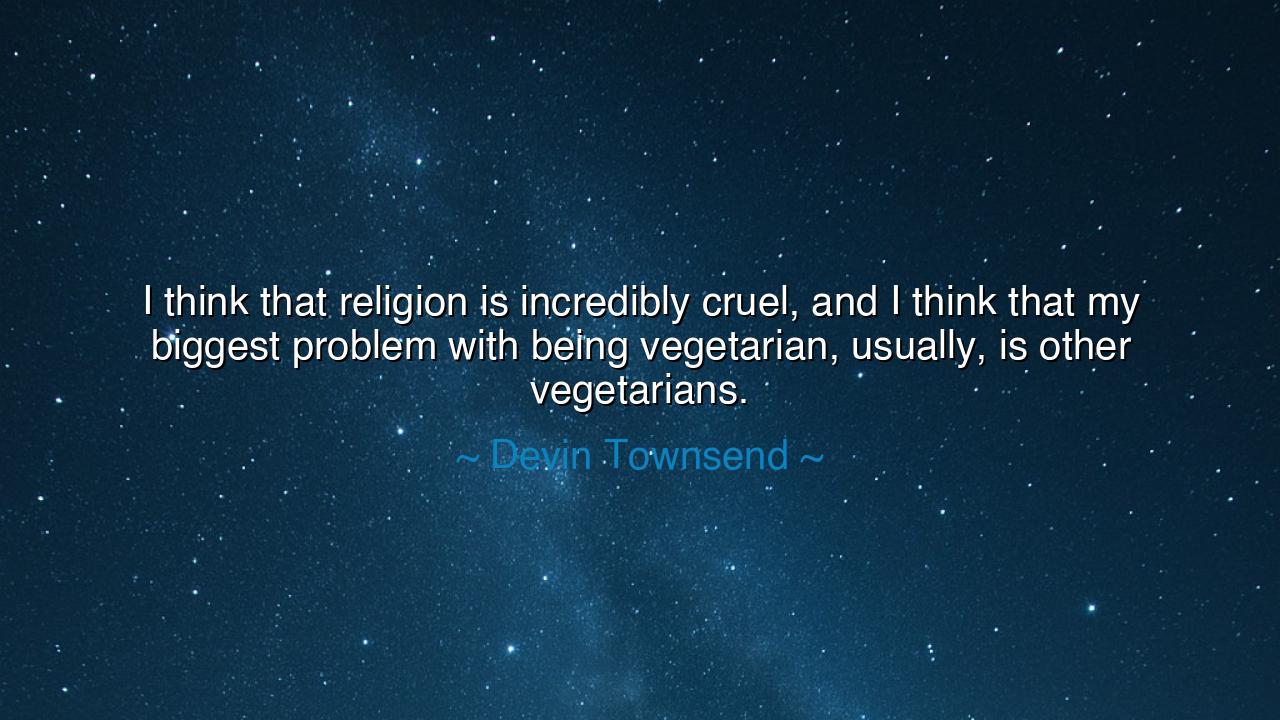
I think that religion is incredibly cruel, and I think that my
I think that religion is incredibly cruel, and I think that my biggest problem with being vegetarian, usually, is other vegetarians.






Devin Townsend, artist of storm and sound, once spoke with unflinching honesty: “I think that religion is incredibly cruel, and I think that my biggest problem with being vegetarian, usually, is other vegetarians.” These words, sharp as a blade, cut to a paradox both ancient and eternal. For what he names is not only the cruelty that can dwell within institutions, but the failure of human beings to live gently even within noble causes. He is not mocking belief, nor mocking compassion, but warning that even the highest ideals may be corrupted when men forget humility.
From the dawn of history, religion has walked as a double-edged force. It has given light, yet also cast long shadows. It has comforted the afflicted, yet often afflicted those who would not conform. Townsend’s charge of cruelty reflects a truth: that many faiths, in their zeal, have wounded the very souls they were meant to heal. And in his second breath, he reminds us that the same fate befalls other movements of virtue, such as vegetarianism. What begins as a path of compassion may harden into judgment when its followers exalt themselves above others. Thus his lament is not against goodness itself, but against the pride that so often cloaks itself in goodness.
Consider the story of the Pharisees in the days of Christ. They were men who pursued holiness with devotion, yet their devotion became a weapon. They laid heavy burdens on others, while forgetting mercy. Jesus rebuked them, saying that to love one’s neighbor outweighed all ritual law. Here we see the echo of Townsend’s words: that the cruelty of religion is not in its core teaching, but in how people wield it, turning what should be compassion into condemnation.
So too with vegetarianism, which at its heart is a call to mercy for animals and mindfulness of life. Yet Townsend confesses that his greatest struggle is not with abstaining from meat, but with fellow vegetarians who act with arrogance, who scorn those who do not share their discipline. The very path meant to teach compassion sometimes births cruelty, when followers exalt their practice above love. The problem is not the principle, but the pride of those who claim it.
Yet, O listener, do not despair. For within Townsend’s criticism lies a path forward. It is a call to return to humility, to the core of every noble pursuit. Whether one walks the road of faith or the road of compassion toward animals, the measure is not how loudly one proclaims belief, but how gently one treats others. The truest believer is not the one who enforces with cruelty, but the one who lives with kindness.
History gives us shining examples. Think of Mahatma Gandhi, who was both deeply spiritual and vegetarian, yet never used these to scorn others. Instead, he embodied humility, teaching by example rather than condemnation. His life shows us that even the strictest discipline, when lived with grace, inspires rather than alienates. He proves Townsend’s lament need not be destiny—that noble paths can be lived with gentleness, not cruelty.
The lesson is clear: beware when conviction hardens into arrogance. Religion should guide the heart to mercy, not to cruelty. Vegetarianism, or any discipline, should awaken compassion, not judgment. When you walk a path of virtue, let it make you humbler, not prouder. Let it teach you to see the frailty in others, not to despise them.
Practical wisdom flows from this: if you are religious, let your faith show in acts of kindness, not in words of condemnation. If you are vegetarian, let your practice inspire through example, not through pride. And in all things, remember that the true measure of any belief is not how fiercely it is preached, but how lovingly it is lived.
So remember, O children of tomorrow: the cruelty of noble things is not in their essence, but in how we wield them. Religion can heal or it can wound; vegetarianism can inspire or condemn. The choice lies in you. Walk your path with humility, and let your life be proof that compassion, when lived truly, is never cruel.






AAdministratorAdministrator
Welcome, honored guests. Please leave a comment, we will respond soon